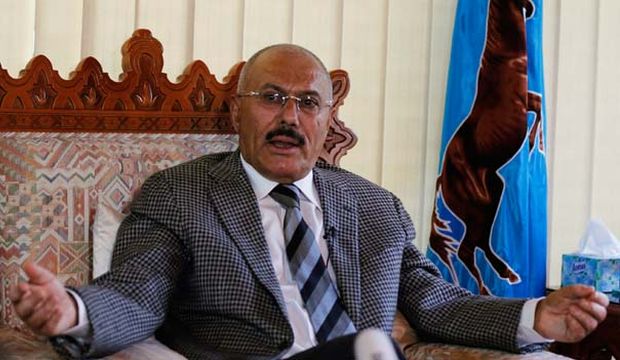
Yemen’s former president Ali Abdullah Saleh talks during an interview with Reuters in the Yemeni capital Sana’a, on May 21, 2014. (Reuters/Khaled Abdullah)
Washington DC and Sana’a, Asharq Al-Awsat—The United States has asked the UN Security Council to impose sanctions on former Yemeni president Ali Abdullah Saleh and two leading members of the Shi’ite Houthi movement currently in control of the country’s capital, Sana’a, and other parts of the country, for “threatening the peace and stability” of Yemen and obstructing the political transition process drawn up following Saleh’s departure from power in 2012.
The proposed sanctions include travel bans and asset freezes on Saleh and Abdul Khaleq Al-Houthi—brother of Houthi movement leader Abdul Malik Al-Houthi and first deputy of its affiliated Ansar Allah group—and Abdullah Yehya Al-Hakim, the second-most senior figure in Ansar Allah and believed to have led the recent advance by the group in the cities of Sana’a, Amran and Ibb.
Since taking control of Sana’a in September, the group has been accused of storming government and military buildings and facilities, as well as carrying out attacks on rival political movements and their leaders.
There have also been widespread allegations that the group has allied with Saleh and former members of his regime still present at the highest echelons of the military and political establishment. The allegations claim this has facilitated the Houthis’ rapid control of several areas in the country, as well as the seemingly inexplicable absence of security forces to block the Houthi advance.
A statement on Sunday from the US administration said that since his ouster in 2012, Saleh “had reportedly become one of the primary supporters of the [Houthi] rebellion,” and accused the former president of being “behind the attempts to cause chaos” throughout the country.
The statement added that since September, when the Houthi takeover began, Saleh has “reportedly [been] inciting instability in Yemen” by using the Houthis “to not only delegitimize the central government, but also create enough instability to stage a coup.”
It also said Washington had received reports in September that an order had been given by Abdul Khaleq Al-Houthi for armed members of the group to attack the US embassy in Sana’a.
The statement accused Hakim of organizing military operations seeking to stage a coup against the Yemeni state and of being in charge of around 300 armed members of the movement currently stationed in Sana’a and other areas of the country. The US accuses these men of carrying out acts of violence against citizens and rival political figures under Hakim’s leadership.
A senior figure at the UN, who requested anonymity because he was not authorized to brief the media, told Asharq Al-Awsat the UN Security Council will be convening a special session on Tuesday to discuss Washington’s request.
The official did not go into detail regarding the UN’s view of the request, saying only that it had been “expected” due to the current events in the country.
He added that the Security Council had in February agreed to draw up resolution 2140, as part of the work of the Council’s Committee on Yemen, to impose sanctions on anyone obstructing the country’s political transition or committing human rights abuses, but that “the situation had not yet reached the stage” where such sanctions could be imposed.
In a statement following a special session held on Sunday, the Security Council called on the Houthi-affiliated Ansar Allah to withdraw from areas currently under its control, and return all weapons seized from military armories to the state.
Meanwhile, the Arab League called on all Yemeni political factions to work together to abide by the Peace and Cooperation agreement signed between different groups, including the Houthis, and President Abd Rabbuh Mansur Hadi in September following the Houthi takeover of the capital.
The agreement stipulates that the Shi’ite group must leave all government and military buildings and installations and return all weapons seized back to the state.
However, reports from Sana’a and other parts of the country suggest the Houthis have continued to seize further state buildings and are using their own volunteer groups to administer security in areas now under their control.
The Arab League also stressed the importance of forming a new government as soon as possible. Yemen’s main political factions, including the Houthis, agreed on Saturday to task new Prime Minister Khaled Bahah and President Hadi with forming a new government.
The appointment of a new prime minister and the formation of new technocratic government were part of the Houthis’ original demands back in September, when the group’s members staged massive rallies throughout Sana’a.
Meanwhile, in another example of the violence that continues to plague Yemen, the leader of a liberal political party seen as close to the Houthis was assassinated in Sana’a on Sunday.
According to the Yemeni state news agency SABA, Mohamed Abdelmalik Al-Motawakal of the Union of Popular Forces party was shot dead by two men on a motorcycle while walking in a street close to his home.
Although no group has claimed responsibility for the killing, it follows a number of attacks on Houthi targets by the radical Sunni Al-Qaeda in the Arabian Peninsula (AQAP), which regards the Shi’ite movement as heretics.
AQAP, which has assassinated dozens of Yemeni officials and members of the security forces in recent years, continues to battle government forces elsewhere in Yemen, and claimed responsibility for a suicide bombing at a Houthi rally in Sana’a in early October, which killed almost 50 people.
Hamdan Al-Rahbi contributed additional reporting from Sana’a.

Trackbacks/Pingbacks